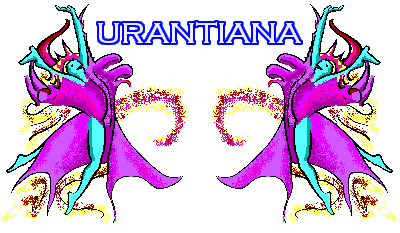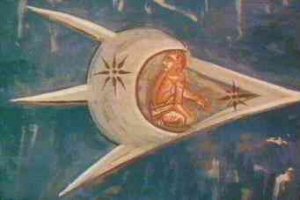Primary tabs
Urantiana
Headline in Daily Mail (UK):
Riddle of the lost city under a lake: Was one of Jesus' disciples laid to rest in ancient metropolis in Kyrgyzstan?
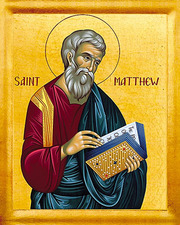
Russian divers made the sensational discovery at Lake Issyk-Kul, where another metropolis was uncovered in 2007.
The most astonishing discovery made by the divers was a piece of a ceramic pot with a stamp apparently inscribed in Armenian and Syrian scripts.
This artifact could prove that there was an Armenian monastery on the lake where, according to legend, St Matthew's body and his many relics were buried.
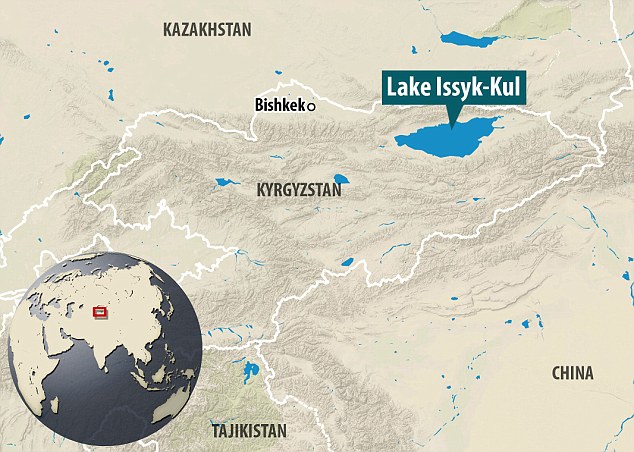
Image from Daily Mail
According to Urantia Paper 139:
When these persecutions caused the believers to forsake Jerusalem, Matthew journeyed north, preaching the gospel of the kingdom and baptizing believers. He was lost to the knowledge of his former apostolic associates, but on he went, preaching and baptizing, through Syria, Cappadocia, Galatia, Bithynia, and Thrace. And it was in Thrace, at Lysimachia, that certain unbelieving Jews conspired with the Roman soldiers to encompass his death. And this regenerated publican died triumphant in the faith of a salvation he had so surely learned from the teachings of the Master during his recent sojourn on earth.

Image: Wikipedia
The Urantia Papers do not specify where Matthew's body ended up, but from Northwestern Turkey to Lake Issyk-Kul in Kyrgyzstan is about 4000 miles.
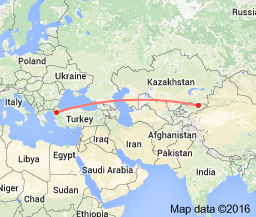
Image: Google
Further, from the Mail article:
Senior Orthodox churchman Vladimir, Metropolitan of Tashkent and Central-Asia, is on record as saying: 'St Matthew died in Syria.
'His followers, escaping from Rome's persecutions, brought the relics of the Apostle to this land.
'The sanctity was kept in an abbey, located on a beach of Issyk-Kul and all the Christian world knew about this fact.'
Syria - still a long way.
Is there other Intelligent Life "out there"? If not, why not? If so, where are they?
Been decades since I read Asimov, but IIRC, in his fictional universe, humanity never found any other intelligent life anywhere Out There. Proto-life, nothing as advanced as animals. I suppose something like that could be because, once an ecological niche is filled (e.g. self-aware humans arise), they, or nature, suppress anyone else rising to that level, or something like that.
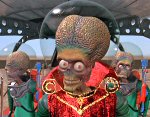 Some say that other material beings might be so "alien" that we might not even recognize them as such, nor they us. Like the sand intelligence on that Trek:NextGen episode.
Some say that other material beings might be so "alien" that we might not even recognize them as such, nor they us. Like the sand intelligence on that Trek:NextGen episode.
[Star Trek: Next Generation episode "Home Soil"]
 I prefer to think that, just as evolution followed patterns of development on our world for physical reasons, life on other worlds would have similar forms, minds, morals, and faith. Because that's how the universe is constructed, by God.
I prefer to think that, just as evolution followed patterns of development on our world for physical reasons, life on other worlds would have similar forms, minds, morals, and faith. Because that's how the universe is constructed, by God.
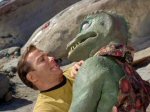 I usually joke, the main clue that there's intelligent life in abundance Out There is that we haven't heard from them yet. We're still in the cradle, the anthropological let-them-develop-some-more stage. And, would you want to associate with primitives like us? Eww.
I usually joke, the main clue that there's intelligent life in abundance Out There is that we haven't heard from them yet. We're still in the cradle, the anthropological let-them-develop-some-more stage. And, would you want to associate with primitives like us? Eww.
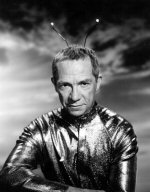 In The Urantia Book universe (what, that again?) the time-space universe is created by the eternal God to be filled with mortal children. They even say there is a world of mortal beings "near" us, although without specifying whether within the solar system or around some "nearby" star, nor what level of evolution they've reached, e.g. radio chatter we could pick up.
In The Urantia Book universe (what, that again?) the time-space universe is created by the eternal God to be filled with mortal children. They even say there is a world of mortal beings "near" us, although without specifying whether within the solar system or around some "nearby" star, nor what level of evolution they've reached, e.g. radio chatter we could pick up.
In their telling, the cosmos is all overseen by the children of God, and mortal world civilizations are usually guided from the earliest days, and so we should know that we are part of universal civilization.
 On our world, indeed our whole section of space, "all the foundations of the earth are out of course" (Psalm 82:5). A similar idea was given in L'Engle's A Wrinkle in Time - the universe is light, but with dark patches. Looks all dark when you're inside the bad parts.
On our world, indeed our whole section of space, "all the foundations of the earth are out of course" (Psalm 82:5). A similar idea was given in L'Engle's A Wrinkle in Time - the universe is light, but with dark patches. Looks all dark when you're inside the bad parts.
In the Urantia story, ever since the "Lucifer rebellion" hundreds of thousands of years ago, we are isolated from the spiritual circuits and won't be reinstated until his trial is completed, no projection on that date given. Whether the "spiritual circuits" being reinstated would be noticed by mortals is not specified. (Lucifer's disciple, the "prince of this world" was "cast down" is no longer in power, but is still free to cause trouble, for those who ask him in.)
I was interested to read last week about CS Lewis (wasn't it?) writing about something similar, worlds under leadership of divine authority - want to look that up.
So, here on Urantia (name of our world, it sez), thanks to that old rebel, we lost our intended planetary guides twice over, and so are largely on our own, revelations from occasional teachers and the Son of God incarnate notwithstanding. Makes us a hot tourist spot for unseen cosmic visitors, though, seeing how we are a planet with so many "who have not seen but have believed."
Interesting note that one of Lucifer's big arguments was that too much time and energy was spent on administering mortal worlds and resurrecting us. A$$hole. [spit]
However, we do have the Urantia revelation to assure us that we are not alone, not abandoned, and are indeed loved and assured of eternal life, if we do not reject this gift of God. In case you didn't already get that memo from the Gospels.
From time to time, I've set out to write about The Urantia Book (UB) for the book thread. This seems the perfect venue to talk about the book's reported origins, how the publisher lost its copyright, about supposed "revelations" and their adherents. You know, not preaching the teachings but talking about it as a book. On the book thread.
Those attempted comments of mine keep ending up as Ace movie review-length treatises, so I file them away without posting, thinking I'll try to whittle them down some time.
This is not any of those.
Instead, my "hook" is a Breitbart article that ticks me off for several reasons. Alas, I keep running into the same problem of not being comment-concise. So, in my next two comments, I'll hit my topic, with apologies in advance for the wall of text. At least I waited 'til after 100 comments to blast you with this.
Why is it false assertions can be so brief, but refutations involve so many words? Or is it just me?
Mainly, keep in mind Gell-Mann, the "amnesia effect" with which regulars here should be familiar. If not, look it up here.
My own authority, so to speak, is having read the UB several times, and studied parts of it in depth repeatedly, having hung around with folks in the Urantia "movement" in the past, and having read a lot about the book and its adherents and opponents. I even have a whole section of my website about the UB, which includes my "UB Comix," many of which, I'd like to think, can be appreciated even without familiarity with the book.
 "Hillary Clinton Fundraises with Leader of Alien Religious Group"
"Hillary Clinton Fundraises with Leader of Alien Religious Group"
Breitbart misrepresents the book and the Urantia movement.
1.
The "religious group" is a diverse menagerie of folks ranging from casual readers of, to raving fanatics about, The Urantia Book.
The Urantia Foundation is the original publisher of the book, and it has an associated official "Brotherhood." There's an unofficial "Fellowship." And there are all manner of private study groups.
There are many other different groups of adherents, some of whom claim all manner of things, including their own channeled "extensions" to the book and bizarre re-interpretations. Meh. Humans, right?
And there's a "silent majority" of individuals who just read the book and aren't joiners or cultists or give a fig about the moovement.
2.
The Foreword and 126 "papers" which comprise the UB purport to be written by higher types of beings. These orders are all described in the books. but from our perspective, for non-students of the book, you might as well call them all "angels."
Anyway, certainly not by "aliens," which suggests little green ET's. It's a religious revelation. Not "how to serve humans." (Twilight Zone reference, in case you don't recognize it.)
[Actual episode title: "To Serve Man"]
3.
The article asserts, "In all likelihood, the book was written at least in part by Chicago doctor William Sadler in the 1920s and might have been based to some degree on the ravings of a lunatic patient."
Siiigh. No and no.
Although "contact" was supposedly first initiated in the late 1920s, the papers were "indicted" and "transcribed into the English language" gradually, from the mid-1930s up through just before WW2.
I'm personally assured it was not "written by" eminent psychologist Dr. Sadler. He was an interesting fellow, respected in his day, but supposedly his interest in the "revelation" was academic, initially. He was a debunker of mystic phenomena, intrigued by one inexplicable case that obliquely led to the appearance of the papers. He is said not to have "believed" the book until very late in the papers' appearance. If Sadler was a genius huckster faking all that, he fooled his closest friends.
That one strange case, described in the Breitbart article as a "lunatic patient" - that's the worst kind of prejudicial propaganda. The individual was reportedly a quite normal fellow by day, but he spouted strange things in his sleep, a condition with which he was unconcerned, but which caused his wife to take him to Dr Sadler. Long story about the "sleeping subject" associated with the book's conception, but the UB's mysterious and complicated origins are beyond the scope of this rant. "Lunatic" is just trash talk.
4.
If you have to categorize this unique work, it would be more part of the spiritual revivalism of first quarter of the last century, not the "New Age" stuff of later decades. Many "New Agers" have certainly taken it up, often with what I consider less than desirable consequences. I'll just leave it at that.
5.
A third of the book is the "Life and Teachings of Jesus,." Non-Christians would call it "Christian," therefore, but many Christians would object to that because the UB does differ with some fundamental Christian doctrines.
Naturally, these doctrinal differences are the closest the Breitbart article comes to accuracy, and which it harps on the most! Hardly a new thing. Some Fundamentalists insist it's the "work of the Devil." (Folks said the same about Jesus; you might recall his response.) It's just especially sad to see such a slanted screed in an article from Andrew's legacy site.
In general, the thrust of the UB's teaching can be simply put: living a life according to what Jesus called the first and greatest commandment and the second like unto it. But the larger content of it is beyond my rant's purposes here.
6. The so-called "leader" is just Celestial Seasonings mogul Mo Siegle.

The first time I met any group of Urantia readers was at a gathering near Chicago in 1974. At the time, the only other folks I knew who had ever even heard of the book were my older brother who introduced the book to me and, separately, to my childhood chum Tom. Tom was excited to find out about the Urantia "Brotherhood," and proposed we travel to their meeting. I was more wary - I didn't want to find out there was some Divine Light Mission or Scientology-like cult ruining this intriguing book. (I mostly saw a chance to visit a gal I'd met in college, she who is today my beloved companion of over four decades and mother of our three offspring.)
The folks at that early gathering mostly looked like anyone I'd meet at the local Episcopal Church (in the old days). Businessmen and homemakers. Siegle's flowered van-full of Colorado hippies were about the only other long-hair and blue-jeans types at that gathering - besides myself.
The general idea back then was of promoting the book by slow growth: basically individual-to-individual ("have you heard of this?") and small living-room study groups. Later generations of UB fans were not so sedate about popularizing the book, with results that I don't consider entirely welcome. As the Breitbart article exemplifies.
Mo was a funny guy. He told this joke… well, another time for that.
In short, in subsequent decades, after some internal clashes among fans of the book, and problems among the official "Brotherhood" and other clots of readers, Mo bought his way onto the board of directors of the publisher, the Urantia Foundation. Not knocking that. Foundations need money.
As he has always been a Colorado hipster, I'm not all that surprised Mo's a Hillary supporter, although I am disappointed, as I am in most of the moovement's latter generations' politics and social attitudes. You know that saying about any organization not specifically geared toward conservatism becomes liberal? Yeah.
You can see, perhaps, why I resent Mo's associating his progressive politics with this great work. However, Mo is hardly the worst of those who pretend to "leadership" while wielding a UB. An apocalyptic sub-cult many years ago, fortunately, ended with disappointment and bitterness, not newsmaking suicides. There's a guy in the Southwest who has headed up one of the better-known cults waving the UB. As I said, humans. Meh.
On the whole, I just find this kind of publicity for the UB distorting, misleading, and unpleasant. It seems to me that it encourages the liberal-ish flakey blare-about-it factions and discourages many more thoughtful and quiet folks who might genuinely appreciate the book, one way or another.
In conclusion (at last): as with with the Bible… or anything… remember Gell-Mann. Don't believe the articles, pro or con, don't listen to the cultists, and certainly don't buy Breitbart writer Patrick Howley about it.
If you really want to know what it's about, you can read the book, free online and downloadable, at Urantia.org.
Apologies again for the wall-o-text. Someday, I'll write that book thread article about it I really wanted to. Not today.
Recently, I ran across this graphic in a couple of places:
When I was very young, certain teachings left me with questions. Being very young, these questions were not always well-formulated as I might put them now in retrospect. And being very young, with certain influences discouraging me from asking many of my innocent questions, I suppose I just expected explanations to come later which would straighten things out for me.
There were just things that seemed wrong, which I would now call inconsistent. Everybody likes the dry land, the new beginning, the reassuring rainbow promise part of the story; but that whole wiping out all of humanity because they were bad part: that just didn't seem to jibe, to my young mind, with the loving, merciful, forgiving Father Jesus talked about. It didn't seem like something Jesus would do.
Whenever I had questions about whether God was like this or like that, I kept coming back to Jesus. (A process which continues to serve me pretty well in my seventh decade.) But even stories of Jesus troubled me. That whole thing about the money changers was a special one. I only had a little kid's idealized vision of Jesus, but it seemed, as I'd say today, completely out of character, for one simple reason: He was scary. Jesus was many things, impressive, powerful, commanding, and strict, but none of that is scary. Why was he scary? Because he was angry.
I'd seen my mortal father angry, for example, and that seemed out of character for him. This of course speaks to what is or is not the real "character" of any person, but unbridled anger has always seemed to me to be a character failing. Yet Jesus didn't teach a scary God, and it was hard for my little self to imagine a truly angry Son of God. Strong and righteous, yes, but not angry.
I never asked anybody about it, though, as I recall. It just got filed in a kind of "what th..?" portion of my understanding. Along with a jillion other "what th's."
 What do the historic records actually say? Very little.
What do the historic records actually say? Very little.
And Jesus went into the temple of God, and cast out all them that sold and bought in the temple, and overthrew the tables of the moneychangers, and the seats of them that sold doves, and said unto them, It is written, My house shall be called the house of prayer; but ye have made it a den of thieves.
Matthew has Jesus clearing the temple, but to whom does "them" refer in "said unto them"? Is he yelling at the folks he's throwing out or is he talking to his followers later?
Matthew closely copies the Mark source, or else both were copying the theoretical Q gospel from which both derive (which source was primarily the "lost gospel" of Andrew, according to Paper 121). The two accounts at least agree on what Jesus said, and generally what he did. However, to whom Jesus speaks is much clearer in Mark. The temple seems to have been cleared by the time Jesus is addressing that remark to his followers:
And they come to Jerusalem: and Jesus went into the temple, and began to cast out them that sold and bought in the temple, and overthrew the tables of the moneychangers, and the seats of them that sold doves; and would not suffer that any man should carry any vessel through the temple. And he taught, saying unto them, Is it not written, My house shall be called of all nations the house of prayer? but ye have made it a den of thieves.
Both accounts agree that Jesus went into the temple, cast out the merchants, overthrew the tables of the moneychangers, and the seats of the dove sellers. Mark adds that [presumably Jesus] "would not suffer... any vessel" to be carried through the temple.
The good chronicler Luke comes along later, but doesn't give even as much detail as Mark. Even more than Matthew, Luke seems to suggest that Jesus is addressing the merchants while he's throwing them out:
And he went into the temple, and began to cast out them that sold therein, and them that bought; saying unto them, It is written, My house is the house of prayer: but ye have made it a den of thieves.
John's Gospel, written long after, doesn't add much but does include a detail which entirely changes the picture and has been the real basis for the historically violent idea of the incident..
And the Jews' passover was at hand, and Jesus went up to Jerusalem. And found in the temple those that sold oxen and sheep and doves, and the changers of money sitting: And when he had made a scourge of small cords, he drove them all out of the temple, and the sheep, and the oxen; and poured out the changers' money, and overthrew the tables; And said unto them that sold doves, Take these things hence; make not my Father's house an house of merchandise. And his disciples remembered that it was written, The zeal of thine house hath eaten me up.
In John's telling, Jesus took the time to rig a scourge of small cords, and then used this weapon to drive "them" out, "them" presumably being the aforementioned livestock sellers and moneychangers, along with the livestock. Jesus seems to have spared the dove sellers' seats, at least, merely telling them to get lost and saying to them something kind-of like what he is reported to have said in Matthew and Mark. Finally, it's Jesus' disciples who recall something… entirely else. (?)
Vast libraries have been written on all the scripture's subjects, and I profess that I have not been a student of anything but the text of the Gospels themselves in researching this. I don't know how scholars interpret the various turns of phrase, in the original languages, or in post-KJV scriptural researches. To this unstudied layman, though, in all cases, Jesus seems to have been reported as acting alone, doing everything himself, and it's usually presumed he did all this in physically violent, if righteous, wrath, what with the scourging and all.
Even when I finally read the Gospels through for myself as an adult, my questions about this were the same. I still wondered, did Jesus really get angry?
MAHARAJJI’S LOVE of Christ was unearthly….
You never knew what a devotee's statement would evoke. A boy came one time and asked, "Maharajji, did Jesus really get angry?”
As soon as Maharajji heard the word 'Jesus,' tears came to his eyes. He was sitting up when the question was asked, and he leaned over on his elbow and tapped his heart three times with tears coming down from his eyes. There was total silence for a moment. Maharajji had brought the reality of Christ into everyone’s consciousness, and he said, “Christ never got angry. When he was crucified he felt only love. Christ was never attached to anything; he even gave away his own body.” And at that point everyone was crying—we had gone through the complete Passion of Christ. And all of a sudden he sat up and said, “The mind can travel a million miles in the blink of an eye—Buddha said that.”
Just as Mark clarified the account of Matthew, so do the Urantia Papers reveal a few details that ameliorate the Gospel accounts.
"The Cleansing of the Temple" is the title Bill Sadler Jr gave to section 1 of Paper 173. Dear reader may wish to follow that link and read that section's less-than-a-dozen paragraphs now, as it's too long to quote in full here. Four paragraphs detail the development of the merchandising in the temple court, and how temple visitors, especially those from out of town, resented this profane economy in the holy temple.
"In the midst of this noisy aggregation of money-changers, merchandisers, and cattle sellers, Jesus, on this Monday morning, attempted to teach the gospel of the heavenly kingdom."
Besides the general rabble engaged in commerce, two events are noted as instigating Jesus' actions.
One was an outburst of noise, the simultaneous eruption of an argument at a moneychanger's table and the blaring of a hundred bullocks driven from one pen to another. What a ruckus! The other was observing the taunting of "a simple-minded Galilean, a man he had once talked with in Iron, being ridiculed and jostled about by supercilious and would-be superior Judeans; and all of this combined to produce one of those strange and periodic uprisings of indignant emotion in the soul of Jesus."
And there you have it. Not anger, really. "Indignant emotion." In the soul. Of Jesus.
But before continuing with the account in Paper 173, we have to flip back to Jesus' first visit to Jerusalem, and the temple, as a youth, with his parents. This journey raised and then dashed the spirits of the young son of Israel. Consider what he felt when, "standing on the brink of Olivet, and Jesus saw for the first time (in his memory) the Holy City, the pretentious palaces, and the inspiring temple of his Father. At no time in his life did Jesus ever experience such a purely human thrill as that which at this time so completely enthralled him as he stood there on this April afternoon on the Mount of Olives, drinking in his first view of Jerusalem." UP124§6¶10 Like many mortal children in many innocent circumstances, he learned he was expecting much more than the reality.
Jesus was profoundly impressed by the temple and all the associated services and other activities. For the first time since he was four years old, he was too much preoccupied with his own meditations to ask many questions. He did, however, ask his father several embarrassing questions (as he had on previous occasions) as to why the heavenly Father required the slaughter of so many innocent and helpless animals. And his father well knew from the expression on the lad’s face that his answers and attempts at explanation were unsatisfactory to his deep-thinking and keen-reasoning son.
On the day before the Passover Sabbath, flood tides of spiritual illumination swept through the mortal mind of Jesus and filled his human heart to overflowing with affectionate pity for the spiritually blind and morally ignorant multitudes assembled for the celebration of the ancient Passover commemoration…. UP124§6¶15
This set-up for disappointment is echoed in the next paper:
From the time they left Nazareth until they reached the summit of the Mount of Olives, Jesus experienced one long stress of expectant anticipation. All through a joyful childhood he had reverently heard of Jerusalem and its temple; now he was soon to behold them in reality. From the Mount of Olives and from the outside, on closer inspection, the temple had been all and more than Jesus had expected; but when he once entered its sacred portals, the great disillusionment began. UP125§0¶3
Jesus suffered a cascade of disappointments during the visit. And he had trouble with the explanations for many of the ceremonial activities. "Jesus simply would not accept explanations of worship and religious devotion which involved belief in the wrath of God or the anger of the Almighty." As the visit went on…
Everywhere Jesus went throughout the temple courts, he was shocked and sickened by the spirit of irreverence which he observed. He deemed the conduct of the temple throngs to be inconsistent with their presence in “his Father’s house.” But he received the shock of his young life when his father escorted him into the court of the gentiles with its noisy jargon, loud talking and cursing, mingled indiscriminately with the bleating of sheep and the babble of noises which betrayed the presence of the money-changers and the vendors of sacrificial animals and sundry other commercial commodities.
But most of all was his sense of propriety outraged by the sight of the frivolous courtesans parading about within this precinct of the temple, just such painted women as he had so recently seen when on a visit to Sepphoris. This profanation of the temple fully aroused all his youthful indignation, and he did not hesitate to express himself freely to Joseph.
Jesus admired the sentiment and service of the temple, but he was shocked by the spiritual ugliness which he beheld on the faces of so many of the unthinking worshipers.
They now passed down to the priests' court beneath the rock ledge in front of the temple, where the altar stood, to observe the killing of the droves of animals and the washing away of the blood from the hands of the officiating slaughter priests at the bronze fountain. The bloodstained pavement, the gory hands of the priests, and the sounds of the dying animals were more than this nature-loving lad could stand. The terrible sight sickened this boy of Nazareth; he clutched his father's arm and begged to be taken away. They walked back through the court of the gentiles, and even the coarse laughter and profane jesting which he there heard were a relief from the sights he had just beheld.
Joseph saw how his son had sickened at the sight of the temple rites and wisely led him around to view the “gate beautiful,” the artistic gate made of Corinthian bronze. But Jesus had had enough for his first visit at the temple…. UP125§1
Jesus was not yet thirteen.
Now you have the deeper background for his "indignant emotion," and in particular the background for the actions Jesus took, according to the Urantia paper:
To the amazement of his apostles, standing near at hand, who refrained from participation in what so soon followed, Jesus stepped down from the teaching platform and, going over to the lad who was driving the cattle through the court, took from him his whip of cords and swiftly drove the animals from the temple. But that was not all; he strode majestically before the wondering gaze of the thousands assembled in the temple court to the farthest cattle pen and proceeded to open the gates of every stall and to drive out the imprisoned animals. By this time the assembled pilgrims were electrified, and with uproarious shouting they moved toward the bazaars and began to overturn the tables of the money-changers. In less than five minutes all commerce had been swept from the temple. By the time the near-by Roman guards had appeared on the scene, all was quiet, and the crowds had become orderly; Jesus, returning to the speaker's stand, spoke to the multitude: "You have this day witnessed that which is written in the Scriptures: 'My house shall be called a house of prayer for all nations, but you have made it a den of robbers.'"
It was this excited crowd who cleared the temple, burst out in songs of praise, and "all the rest of that day while Jesus taught, guards set by the people stood watch at every archway, and they would not permit anyone to carry even an empty vessel across the temple courts."
That's how you do it. That's real leadership. Inspiring. Majestic. Electrifying. He knew just what to do, with a sure sense of the crowd, and just how to do it right. Pure political genius with spiritual purpose. That, to me, sounds like Jesus the Son of Man and the Son of God.
The apostles took no part and were stunned by the whole affair, for reasons the Papers relate. There's no telling what influence their lack of involvement, or understanding, might have had on the reports that came down to us through the Gospels. To them, Jesus was taking actions that they considered unexpected and, probably — ironically for my approach — completely out of character for him. He was scary.
While Jesus got to do what his thirteen-year-old self could only have dreamt of doing, both for cleansing the temple and sparing the sacrificial animals, this was more important a teaching than that. It is not a protest against commerce, per se, as many have made it. It is not, as we see, permission for violence, even in "righteous" causes. It is, however, inspiration to strength, resistance to profanation, and assertion of rights by the principled. As the section concludes:
This cleansing of the temple discloses the Master's attitude toward commercializing the practices of religion as well as his detestation of all forms of unfairness and profiteering at the expense of the poor and the unlearned. This episode also demonstrates that Jesus did not look with approval upon the refusal to employ force to protect the majority of any given human group against the unfair and enslaving practices of unjust minorities who may be able to entrench themselves behind political, financial, or ecclesiastical power. Shrewd, wicked, and designing men are not to be permitted to organize themselves for the exploitation and oppression of those who, because of their idealism, are not disposed to resort to force for self-protection or for the furtherance of their laudable life projects.
A vital lesson for our times.
